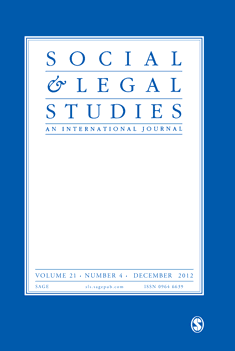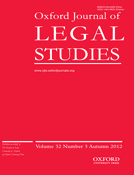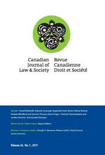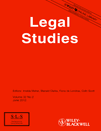
Alternative Law Journal
Scope & Guideline
Fostering Critical Discourse for a Just Society.
Introduction
Aims and Scopes
- Social Justice and Human Rights Advocacy:
The journal emphasizes the promotion of social justice and human rights, exploring topics such as Indigenous rights, LGBTQIA+ rights, and the rights of marginalized communities within the legal framework. - Critical Legal Studies:
It engages with critical legal studies by questioning traditional legal doctrines and practices, advocating for reforms that address systemic inequalities and injustices. - Interdisciplinary Approaches:
The journal encourages interdisciplinary research that integrates insights from sociology, psychology, environmental studies, and other fields to enrich legal scholarship and practice. - Innovative Legal Technologies:
The exploration of how emerging technologies, such as AI and legal chatbots, can impact legal practice and access to justice is a key focus, highlighting both potential benefits and ethical challenges. - Environmental Law and Climate Justice:
Addressing legal responses to climate change and environmental degradation, the journal investigates the role of law in promoting sustainability and protecting vulnerable populations affected by environmental issues.
Trending and Emerging
- Mental Health and Law:
There is a rising focus on the intersection of mental health and law, exploring how legal frameworks can better accommodate and support individuals with mental health issues, particularly in criminal justice and family law contexts. - Climate Change and Environmental Justice:
The journal is increasingly addressing climate change and its legal implications, emphasizing the need for laws that protect the environment and promote sustainability as a critical aspect of social justice. - Technology and Access to Justice:
Emerging themes around the use of technology in legal practice, including AI and online dispute resolution, are gaining traction, highlighting the potential for these innovations to improve access to justice. - Indigenous Rights and Sovereignty:
There is a growing emphasis on Indigenous rights, sovereignty, and the legal frameworks that govern these issues, reflecting a broader societal recognition of the importance of Indigenous perspectives in legal discourse. - Gender and Legal Reform:
The journal is increasingly focusing on gender issues within the legal context, particularly concerning sexual violence, reproductive rights, and gender equality, indicating a commitment to addressing systemic gender-based injustices.
Declining or Waning
- Traditional Legal Doctrines:
There appears to be a waning focus on traditional legal doctrines and procedural aspects of law, as the journal increasingly prioritizes social justice, critical perspectives, and practical implications over established legal frameworks. - Conventional Legal Education:
The emphasis on conventional legal education approaches is decreasing, with a growing interest in alternative legal education models that prioritize practical skills, wellness, and interdisciplinary learning. - Historical Legal Analysis:
While historical legal perspectives were once a consistent feature, there is a noticeable decline in papers focusing exclusively on historical analyses of legal cases or doctrines, suggesting a shift towards contemporary issues. - Administrative Law:
The frequency of publications specifically addressing administrative law has diminished, possibly overshadowed by more pressing social justice themes and the need for reform in areas such as human rights and environmental law.
Similar Journals

ALBERTA LAW REVIEW
Exploring critical legal issues in Canada and beyond.ALBERTA LAW REVIEW, published by the University of Alberta, stands as a key academic journal in the field of law, contributing to the discourse on legal issues and developments in Canada and beyond. With an ISSN of 0002-4821 and an E-ISSN of 1925-8356, this journal has been pivotal since its inception in 1974, providing a platform for legal scholarship that spans a diverse range of topics, from constitutional law to social justice. Although it operates under a traditional subscription model, the journal's illustrious history and rigorously peer-reviewed content affirm its stature in advancing legal research and education. The Alberta Law Review not only serves as a resource for academics and students, but also offers legal practitioners critical insights and analysis pertinent to contemporary legal challenges. With a commitment to enlightening the discourse around law, it is an invaluable asset for anyone engaged in the legal profession or related fields.

Derecho PUCP
Fostering innovative scholarship in law.Derecho PUCP is a distinguished open access journal published by the Pontificia Universidad Católica del Perú, specifically from the Faculty of Law. With a commitment to advancing legal scholarship, this journal has been an essential resource in the field of law since 2005, providing researchers, practitioners, and students with access to critical analyses and discussions on various legal topics. Based in Lima, Peru, Derecho PUCP holds a prestigious position with a Q2 ranking in the Law category, reflecting its impactful contributions to the social sciences, particularly in the legal domain. The journal publishes cutting-edge research and promotes innovative discourse, aiming to foster academic excellence and engage with contemporary legal challenges. As it continues to converge into its future issues from 2019 to 2024, Derecho PUCP exemplifies a vital platform for those committed to the pursuit of legal knowledge and research.

SOCIAL & LEGAL STUDIES
Advancing Interdisciplinary Insights in Law and SocietySOCIAL & LEGAL STUDIES, published by SAGE Publications Ltd, stands at the forefront of interdisciplinary research within the spheres of law, sociology, and political science. With an ISSN of 0964-6639 and an E-ISSN of 1461-7390, the journal has established a significant presence in academia since its inception in 1992. This esteemed journal, recognized as a Q1 publication in Law and holding Q2 status in both miscellaneous Social Sciences and Sociology & Political Science categories, garners attention from leading scholars and practitioners alike, evidenced by its impressive Scopus rankings, including a top 88th percentile in Law. Although it does not offer open access, researchers and students can rely on this journal for high-quality, peer-reviewed articles that synthesize theoretical and empirical insights, addressing contemporary legal and social issues. As it converges into 2024, SOCIAL & LEGAL STUDIES continues to be a vital platform for advancing discussions that shape the interplay between societal norms and legal frameworks.

Oxford Journal of Legal Studies
Fostering Scholarly Excellence in Legal StudiesThe Oxford Journal of Legal Studies, published by Oxford University Press, stands as a prestigious platform for scholarly discourse within the field of law. Renowned for its impactful contributions to legal scholarship since its inception in 1981, this journal has established itself in the top tier of its category, currently classified as Q1 in Law based on the 2023 category quartiles. With its ISSN 0143-6503 and E-ISSN 1464-3820, the journal provides a comprehensive exploration of contemporary legal issues, theoretical perspectives, and empirical research, attracting contributions from leading academics and practitioners alike. Residing within the Social Sciences arena, it holds an impressive rank of 194/1025, landing it in the 81st percentile according to Scopus rankings. Though not currently an open-access publication, the Oxford Journal of Legal Studies remains vital for researchers, professionals, and students eager to deepen their understanding of legal frameworks and contemporary challenges within the legal landscape. Located in the heart of the United Kingdom, at Great Clarendon St, Oxford OX2 6DP, England, the journal is an indispensable resource for those advancing the study and practice of law.

Canadian Journal of Law and Society
Bridging Legal Theory and Societal ImpactThe Canadian Journal of Law and Society, published by Cambridge University Press, is a distinguished academic journal dedicated to the multidisciplinary exploration of legal systems, social dynamics, and the intricate relationships that shape law and society. With an ISSN of 0829-3201 and an E-ISSN of 1911-0227, this journal has made significant contributions to the fields of Law, Sociology, and Political Science since its inception in 1986. Recognized in the 2023 category quartiles as Q3 in both Law and Sociology and Political Science, it stands as a credible platform for critical research, theoretical discussions, and empirical studies. Although not an open-access journal, it provides valuable insights that foster academic discourse and enhance understanding within the legal and social sciences domains. Addressed from the Edinburgh Building, Shaftesbury Road, Cambridge, England, the journal serves as an essential resource for researchers, practitioners, and students seeking to navigate the complexities of law and its societal impacts.

Rutgers University Law Review
Pioneering discussions that matter in law.Rutgers University Law Review is a premier legal journal published by Rutgers University, dedicated to advancing scholarly discourse in the field of law. Established to serve as a platform for legal practitioners, academics, and students, this journal showcases a rich tapestry of articles, notes, and commentaries that critically engage with contemporary and historical legal challenges. The journal, indexed with an ISSN of 2374-3859, provides open access options, ensuring that its valuable insights are readily available to the global legal community. The Scopus ranking places it at a commendable 61st percentile within the domain of Social Sciences and Law, highlighting its significance and impact in the legal scholarship landscape. By fostering an environment of rigorous academic inquiry, the Rutgers University Law Review continues to play an essential role in shaping future legal frameworks and discussions.

Justicia
Empowering voices in the pursuit of justice.Justicia, a distinguished academic journal published by UNIV SIMON BOLIVAR, serves as a vital platform for the dissemination of research within the fields of law, political science, and social justice. Since its transition to Open Access in 2014, it has broadened its reach, enabling scholars, practitioners, and students from around the globe to engage with high-quality research unrestricted by subscription barriers. Located in Barranquilla, Colombia, the journal aims to foster interdisciplinary dialogue and innovation by publishing original articles, reviews, and case studies that reflect contemporary legal challenges and social issues. With its commitment to elevating discussions on justice and governance, Justicia plays a crucial role in shaping legal scholarship and influences policy-making, making it an essential resource for anyone dedicated to understanding and contributing to the field.

Revista CES Derecho
Advancing Legal Discourse, One Article at a Time.Revista CES Derecho is a distinguished academic journal published by UNIV CES, focused on the multifaceted field of law. Situated in Medellin, Colombia, this journal serves as a vital platform for disseminating innovative research and critical analysis in legal studies, encouraging the exchange of ideas among scholars, practitioners, and students alike. With its commitment to open access, the journal provides unfettered access to its content, ensuring that its valuable insights reach a diverse audience. Although specific metrics such as H-Index and Scopus rankings are currently unavailable, the Revista CES Derecho aims to enhance the quality of legal education and practice by fostering scholarly discourse and informing progressive legal thought. Researchers and practitioners are invited to contribute to this dynamic publication, further enriching the discourse in the ever-evolving landscape of law.

YALE LAW JOURNAL
Connecting Scholars and Practitioners in LawYale Law Journal, founded in 1891 and published by Yale Law J Co Inc, stands as a preeminent peer-reviewed legal journal in the United States, recognized for its rigorous scholarship and influential contributions to legal theory and practice. With an impact factor that underscores its peerless reputation, this journal maintains a Q1 ranking in the law category, situating it in the top tier of legal publications globally, as indicated by its Scopus rank of 66 out of 1025, placing it in the 93rd percentile. The journal publishes a comprehensive range of articles, essays, and reviews that address vital topics across the legal spectrum, aiming to foster dialogue and innovation within the legal community. Although it does not offer open access, its meticulous curation of content ensures that researchers, practitioners, and students alike have access to the most impactful legal scholarship. Located at 401-A Yale Station, New Haven, CT 06520, the journal continues to shape the legal landscape, making it an essential resource for anyone engaged in the study or practice of law.

Legal Studies
Advancing Legal Thought Through Rigorous ScholarshipLegal Studies, published by Cambridge University Press, is a leading journal in the field of law, recognized for its commitment to advancing scholarly dialogue and critical analysis of legal issues. With an ISSN of 0261-3875 and an E-ISSN of 1748-121X, this prestigious journal has been a key resource for researchers, practitioners, and students since its inception in 1981, and it continues to serve the academic community through rigorous peer-reviewed research up to 2024. Positioned in the Q2 category of law journals and ranked within the 60th percentile among social sciences law publications in Scopus, Legal Studies offers a unique platform for innovative legal scholarship, exploring contemporary legal phenomena and their societal implications. Although not an open-access journal, it provides subscribers and institutional partners with exclusive access to high-quality articles that inform legal thought and practice. The journal’s aim is to foster interdisciplinary perspectives and to challenge traditional viewpoints, making it an indispensable tool for anyone engaged in the legal field.